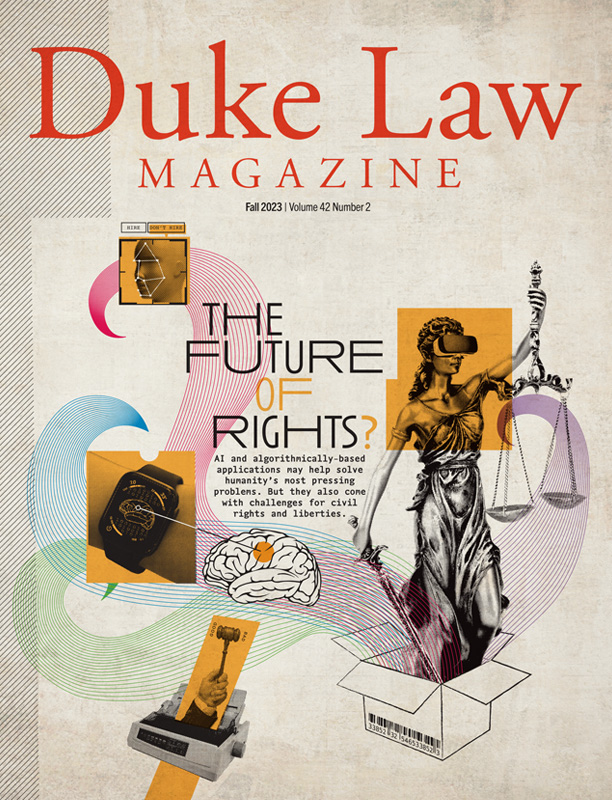
Robert E. Bishop
Empirical scholar of law and finance
Robert E. Bishop, an empirical scholar of the economics of corporate governance and securities law with experience in public policy, legal practice, and finance, joined the faculty July 1 as an associate professor of corporate law.
Bishop was previously a fellow at both the New York University School of Law Institute for Corporate Governance and Finance and the Berkeley Center for Law and Business at the University of California, Berkeley School of Law. His research interests span topics at the intersection of law and finance, including corporate governance, hedge fund activism, securities, and markets more broadly, with emphasis on the market consequences of regulatory intervention.
He is teaching Business Associations this fall, and in the spring semester he will offer a new financial valuation class that will train students to build discounted cash flow, IPO, M&A, and leveraged buyout models, similar to programs taught in business schools.
“Duke Law School is a truly awesome research institution with a great set of students and a long history of policy impact,” Bishop said. “I’m thrilled to join the faculty. I’ve been fortunate to have professors who played a fundamental role in my life and helped me get here, and I hope to play that role with students and help them get to wherever they want to be.”
“Bobby Bishop brings to Duke Law a unique combination of legal scholarship, regulatory experience, and quantitative financial skills,” said John M. de Figueiredo, the Russell M. Robinson II Distinguished Professor of Law, Strategy, and Economics.
“This will translate into his not only pushing the frontiers of academic understanding of business organizations, but also will allow Duke Law to extend its offering of advanced and interdisciplinary business law courses for our students.”
Born and raised in Texas, Bishop received a bachelor’s degree in mathematics from the University of Chicago. He worked in the Middle East and East Africa for the U.S. Department of Defense before earning his JD and MBA from Columbia University.
Bishop clerked on the Delaware Court of Chancery from 2017 to 2018 and served as counsel to U.S. Securities and Exchange Commissioner Robert J. Jackson, Jr., before resuming his academic studies at Yale University, where he earned an MA, M.Phil., and PhD in accounting.
During the COVID-19 pandemic, Bishop served as senior advisor on financial markets at the U.S. Department of the Treasury, where he helped implement the Coronavirus Aid, Relief, and Economic Security (CARES) Act, a $2.2 trillion economic relief package signed into law in March 2020. He worked on a team that set up Federal Reserve lending facilities to backstop financial markets, including the Commercial Paper Funding Facility, Corporate Credit Facility, and Money Market Mutual Fund Liquidity Facility.
“Those early months were a fascinating and crazy time of getting those set up,” Bishop recalled. “As each of those facilities came into place and the market stabilized, my portfolio broadened to include everything from debt issuance and the debt limit to housing, student loans, and Treasury’s work on Puerto Rican economic reforms. It was really special and a great honor to be there.”
In his doctoral dissertation, “Investor Communication and Say-on-Pay,” Bishop explores how a corporate governance mechanism in the 2010 Dodd-Frank Act may have had the unintended consequence of giving hedge funds a channel to gauge shareholder receptiveness to activist intervention.
The “say-on-pay” provision mandated a non-binding vote on executive pay by shareholders of U.S. companies and also allowed shareholders to choose the frequency of such votes at the time of enactment. Bishop’s empirical analysis identified the relationship between the say-on-pay vote and future hedge fund activity.
“[T]hose who favor shareholder voting as a corporate governance mechanism should carefully consider the effects of such votes on investor communication when evaluating such policies,” he writes.
Bishop’s interests in business law and finance developed at Columbia Law under Jackson, who was a professor there before serving as an SEC commissioner from January 2018 to February 2020.
In Activist Directors and Agency Costs: What Happens When an Activist Director Goes on the Board?, 104 Cornell Law Review 381 (2019), Bishop, Jackson, and co-authors John C. Coffee Jr., and Joshua R. Mitts found a rise in information leakage in a company’s stock when a hedge fund-nominated director was appointed to its board. Through an empirical analysis of settlement agreements between companies and activist hedge funds, the authors assess the agency costs of hedge fund activism and develop a new methodology that regulators can use to identify patterns of informed trading.
“[To the extent that hedge fund activists present themselves as the champion of all the shareholders, there may be a need for greater oversight of this imperfect champion,” they write.
Along with Jackson, Bishop cites as a mentor Berkeley Law professor Frank Partnoy, with whom he is collaborating on several research projects at the intersection of law and finance. Along with Partnoy, he co-founded the International Institute of Law and Finance, a non-profit, non-partisan institution that seeks to bridge the gap between academic research and financial regulatory policy, particularly by providing financial regulators with summaries of academic research through formal comment letters on proposed SEC rules. One IILF comment letter garnered 85 signatures from law and finance academics – more than three times the number of academic signatures ever submitted on such a letter, Bishop said.
“We are thrilled that Bobby Bishop is joining Duke Law this fall,” said Karl W. Leo Distinguished Professor of Law Elisabeth de Fontenay.
“His research lies at the cutting edge of finance, and it is informed by his empirical training in finance and accounting, his extensive contacts with market participants, and his work at both the SEC and Treasury. Our students will benefit so much from his boundless energy, intellectual curiosity, and industry knowledge.”

